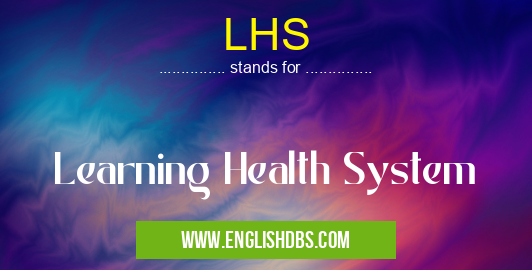What does LHS mean in HEALTHCARE
Learning Health System (LHS) is an innovative approach that integrates healthcare delivery and research to continuously improve patient outcomes and population health. It is a collaborative effort among healthcare professionals, researchers, and patients to utilize data, technology, and innovation to drive healthcare advancements.

LHS meaning in Healthcare in Medical
LHS mostly used in an acronym Healthcare in Category Medical that means Learning Health System
Shorthand: LHS,
Full Form: Learning Health System
For more information of "Learning Health System", see the section below.
» Medical » Healthcare
Key Features of LHS
- Data-Driven: LHS utilizes data from electronic health records, patient-reported outcomes, and other sources to identify patterns, trends, and areas for improvement.
- Research Embedded: Research is an integral part of LHS, with studies conducted to evaluate interventions, test new technologies, and identify best practices.
- Continuous Improvement: LHS promotes a culture of continuous learning and improvement, based on the analysis of data and research findings.
- Patient-Centered: Patients are actively involved in LHS, providing feedback, participating in research, and shaping the direction of care.
Benefits of LHS
- Improved patient outcomes
- Increased efficiency and cost-effectiveness of healthcare delivery
- Enhanced patient engagement and satisfaction
- Acceleration of medical research and innovation
Essential Questions and Answers on Learning Health System in "MEDICAL»HEALTHCARE"
What is a Learning Health System (LHS)?
A Learning Health System (LHS) is a healthcare system that continuously learns from its own performance data and uses this knowledge to improve patient outcomes. LHSs use data to identify areas for improvement, implement interventions to address these areas, and track the impact of these interventions on patient outcomes. The goal of an LHS is to create a healthcare system that is constantly improving and delivering the best possible care to patients.
What are the benefits of a Learning Health System?
There are many benefits to implementing a Learning Health System, including:
- Improved patient outcomes: LHSs can lead to improved patient outcomes by identifying and addressing areas for improvement in healthcare delivery.
- Reduced costs: LHSs can help to reduce healthcare costs by identifying and eliminating waste and inefficiency in the healthcare system.
- Increased patient satisfaction: LHSs can lead to increased patient satisfaction by providing patients with better care and more involvement in their own healthcare.
- Improved population health: LHSs can help to improve population health by identifying and addressing the health needs of the community.
How does a Learning Health System work?
LHSs work by using data to identify areas for improvement, implement interventions to address these areas, and track the impact of these interventions on patient outcomes. This process is known as the "Plan-Do-Study-Act" (PDSA) cycle. The PDSA cycle is a continuous process that allows LHSs to learn from their experiences and make improvements over time.
What are the challenges to implementing a Learning Health System?
There are several challenges to implementing a Learning Health System, including:
- Data availability and quality: LHSs require access to high-quality data in order to identify areas for improvement and track the impact of interventions.
- Lack of infrastructure: Many healthcare organizations do not have the infrastructure in place to support a Learning Health System.
- Cultural resistance: There may be resistance to change from healthcare providers and other stakeholders.
What is the future of Learning Health Systems?
The future of Learning Health Systems is bright. As healthcare data becomes more available and accessible, and as healthcare organizations become more aware of the benefits of LHSs, the adoption of LHSs is likely to increase. LHSs have the potential to revolutionize healthcare delivery and improve the lives of patients around the world.
Final Words: Learning Health Systems represent a promising approach to transform healthcare delivery by integrating research and data into practice. By leveraging technology, collaboration, and patient involvement, LHS aim to continuously improve health outcomes and promote population health.
LHS also stands for: |
|
| All stands for LHS |
